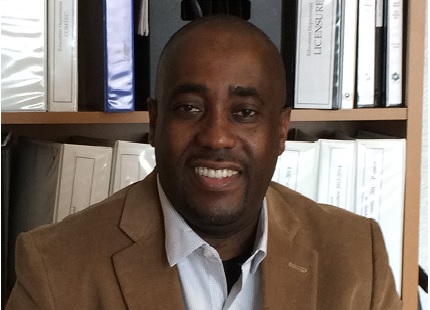National Science Foundation LSAMP Proposal
The Louis Stokes Alliances for Minority Participation (LSAMP) program is an National Science Foundation-sponsored research grant opportunity for four-year colleges and universities, community colleges, and public K-12 school systems. The overall goal of the LSAMP program is to help diversify the nation's STEM workforce by funding institutions of higher education to implement comprehensive, evidence-based, and sustained approaches to broadening the participation of students historically underrepresented in STEM disciplines (African Americans, Hispanic Americans, American Indians or Alaska Natives, Native Hawaiians or Other Pacific Islanders).
Framingham State University is preparing to submit on November 15, 2019 to the NSF an LSAMP Pre-Alliance planning proposal, which will allow us and our partners to plan and conduct the activities necessary to form a new alliance. Alliances are consortia of multiple degree-granting institutions, all focused on pre-college and undergraduate recruitment and retention activities leading to increased graduation of underrepresented STEM majors. We plan to submit, in November of 2020, a STEM Pathways and Research Alliances proposal, which are projects that focus on the full STEM pathway and provide direct support for undergraduate students but also serve as a hub for the production of scholarly STEM research and evaluation to increase the knowledge-base and utilization in broadening participation. This will be a five-year project.
Chair, Physics & Earth Science
#
Email: lmckenna1@framingham.edu Dr. Larry McKenna is Associate Professor of Earth and Environmental Sciences and Chair of the Department of Physics and Earth Sciences at Framingham State University. He came of age in the 1960s, but-in a sign of things to come-it wasn’t the social movements of the time that caught his interests, but the explosion of science and technology that captivated him. He watched every Apollo spaceflight, kept scrapbooks of photos returned by space probes, and even had his own telescope. So it was no surprise that his eyes were firmly fixed on the stars as he finished high school and went off to MIT for his undergraduate education. Then, the unexpected. He took a geology class from Professor John Southard. Prof Southard loved teaching. He loved the material, he loved the students, he loved the little boxes he kept rocks in, he loved the field trips-he just loved every aspect of teaching. McKenna became a geologist after the first meeting, and still teaches every class to inspire the same love of learning that Southard inspired in him. After graduating with a SB in Geology from MIT, he stayed for graduate school, completing his Ph. D. in Geology and Geochemistry under the direction of Dr. Kip Hodges. After 7 years on the faculty at the University of Kansas, he formed Working Knowledge, Inc., which designs, produces and publishes content-based professional development for K-12 science teachers. McKenna joined the faculty at FSU in 2008. His primary activities lie at the intersection of climate change, policy, and teaching. He is co-director of the Center for Climate Change Education at Framingham State, and until recently coordinated the STEM Masters in Education program. He is completing his college-level textbook, Conversations with the Earth for Oxford University Press. McKenna and his wife Patti live in Boston. Their two remarkable and mathematically-oriented daughters live in Manhattan and Greis, Germany. Find Dr. McKenna's curciulum vita here.
Associate Professor, Education
#
Email: wpowell1@framingham.edu Dr. Wardell Powell is an assistant professor of education at Framingham State University. He began his teaching career in the Bronx, New York, where he taught life and health science with the New York City Department of Education before relocating to Florida in 2003. Dr. Powell is a certified biology teacher in grades 6-12 in the state of Florida and has taught life science courses in the K-12 system for ten years. Dr. Powell also served as an Instructional Science Coach with Polk County School Board in Florida. In this position, he assisted school-based administrators and teachers in elementary, middle, high schools, and opportunity centers to analyze school, class, and individual student data to determine needs in the content area. In this position, he also supported teachers in planning science instruction to meet the needs of all students through differentiated instruction. Prior to becoming a faculty member at Framingham State University, Dr. Powell completed a two year post-doctoral fellowship on National Science Foundation-funded project titled Reclaiming Access to Inquiry-based Science Education (RAISE) for Incarcerated Students: An Investigation of Project-Based Inquiry Science within a Universal Design for Learning Framework in Juvenile Corrections Settings at the University of Massachusetts, Amherst. His scholarly interest centers on effective science instruction for K-12 students with and without specific learning disabilities and the development of accessible science curriculum for such students. Dr. Powell is specifically interested in the use of the socioscientific issues to provide a framework for climate change education in the K-12 system. Dr. Powell recently developed a science curriculum for a non-profit organization for use in out of classroom space. This organization remediates achievement gaps and prepares minority students for acceptance to and success at top independent, Catholic, and public exam schools in the Northeastern United States. The title of his curriculum is, Using Socioscientific Issues to Enhance Middle School Students’ Understanding of Human Impacts on Earth’s Systems. Dr. Powell recently published a book chapter titled Using Socioscientific Issues to Enhance Evidence-Based Reasoning Among Middle School Students in the Handbook of Research on Critical Thinking and Teacher Education Pedagogy. He also has another book chapter that is under review for publication in the book titled Next Generation Digital Tools and Applications for Teaching and Learning Enhancement. Dr. Powell's curriculum vita is available here.


